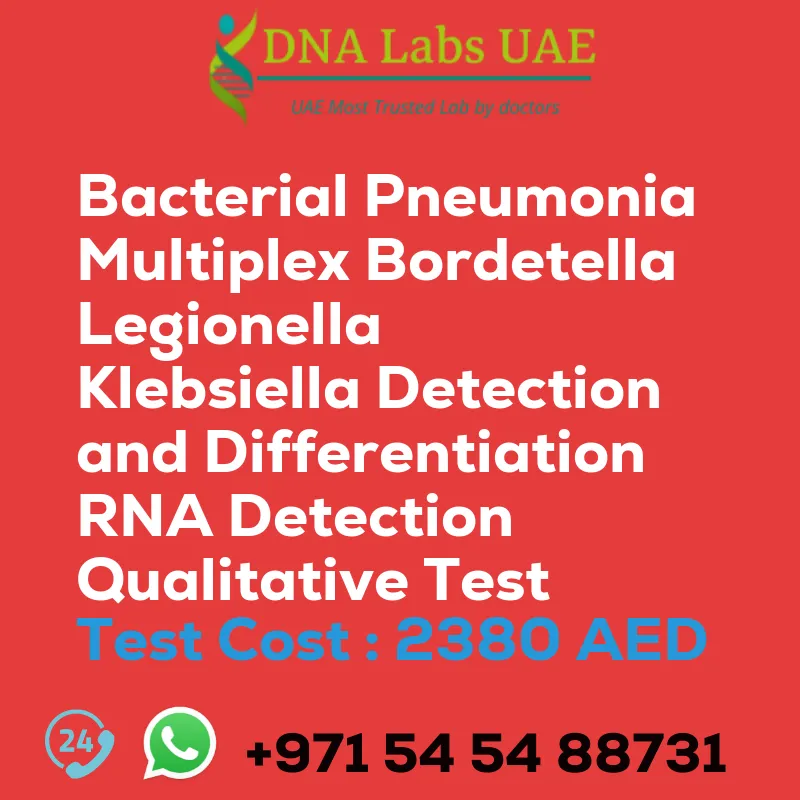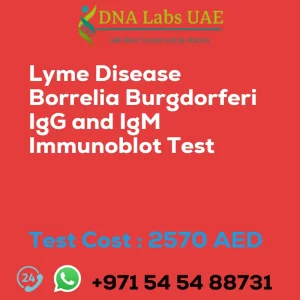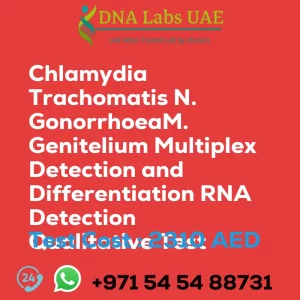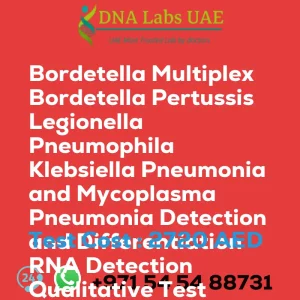Bacterial Pneumonia Multiplex Bordetella Legionella Klebsiella Detection and Differentiation RNA Detection Qualitative Test
Welcome to the DNA Labs UAE blog! Today, we will be discussing the Bacterial Pneumonia Multiplex Bordetella Legionella Klebsiella Detection and Differentiation RNA Detection Qualitative Test.
Test Details
The Bacterial Pneumonia Multiplex Bordetella Legionella Klebsiella Detection and Differentiation RNA Detection Qualitative Test is a qualitative RNA detection test. It is specifically designed to identify and differentiate between three common bacterial pathogens that can cause pneumonia: Bordetella, Legionella, and Klebsiella.
The test works by detecting the presence of specific RNA sequences that are unique to each of these bacteria. RNA is extracted from a patient sample, such as sputum or bronchoalveolar lavage fluid, and then amplified using a technique called reverse transcription polymerase chain reaction (RT-PCR). This amplification process allows for the detection of even small amounts of RNA in the sample.
After amplification, the amplified RNA is labeled with fluorescent markers that are specific to each bacterial target. The labeled RNA is then analyzed using a specialized instrument that can detect and quantify the fluorescent signals. By comparing the fluorescence signals to known standards, the test can determine the presence and quantity of each bacterial target in the patient sample.
The Bacterial Pneumonia Multiplex Bordetella Legionella Klebsiella Detection and Differentiation RNA Detection Qualitative Test is designed to provide a rapid and accurate diagnosis of bacterial pneumonia caused by Bordetella, Legionella, or Klebsiella. Differentiating between these pathogens is important because they may require different treatment approaches. The test can help guide appropriate antibiotic therapy and improve patient outcomes.
It is important to note that this test is a qualitative test, meaning it can determine the presence or absence of the bacterial pathogens but cannot provide information about the severity of the infection or the patient’s immune response. Additional tests may be needed to further characterize the infection and guide treatment decisions.
Test Components and Price
The Bacterial Pneumonia Multiplex Bordetella Legionella Klebsiella Detection and Differentiation RNA Detection Qualitative Test is priced at 2380.0 AED. The test requires various sample conditions, including nasopharyngeal secretions, swabs, oral/rectal swabs, necropsy samples, blood, urine, sputum, throat swab, bronchoalveolar lavage samples, and lung tissue.
Report Delivery
The report for this test will be delivered on the 4th working day via email within 48 hours or on the phone within 36 hours.
Method and Test Type
The method used for the Bacterial Pneumonia Multiplex Bordetella Legionella Klebsiella Detection and Differentiation RNA Detection Qualitative Test is Real Time PCR. The test type is viral.
Test Department and Doctor
This test is conducted in the Genetics department and is recommended by physicians.
Pre Test Information
Prior to undergoing the Bacterial Pneumonia Multiplex Bordetella Legionella Klebsiella Detection and Differentiation RNA Detection Qualitative Test, patients are required to sign a consent document and provide any clinical history related to bacterial pneumonia multiplex (Bordetella, Legionella, Klebsiella) detection and differentiation (RNA Detection) qualitative test.
Thank you for reading our blog! If you have any further questions or would like to schedule an appointment for the Bacterial Pneumonia Multiplex Bordetella Legionella Klebsiella Detection and Differentiation RNA Detection Qualitative Test, please contact us.
| Test Name | Bacterial Pneumonia Multiplex Bordetella Legionella Klebsiella detection and differentiation RNA Detection Qualitative Test |
|---|---|
| Components | |
| Price | 2380.0 AED |
| Sample Condition | Nasopharyngeal secretions, swabs, Oral\/rectal swabs and necropsy samples. Blood,Urine, Sputum, throat swab, and bronchoalveolar lavage samples, lung tissue,etc. |
| Report Delivery | 4th Working Day Email : 48 hours.On phone : 36 hours |
| Method | Real Time PCR |
| Test type | Viral |
| Doctor | Physician |
| Test Department: | Genetics |
| Pre Test Information | Need to sign Consent document and bring any clinical history of patient forBacterial Pneumonia Multiplex (Bordetella, Legionella, Klebsiella)detection & differentiation (RNA Detection) QualitativeTest |
| Test Details |
The Bacterial Pneumonia Multiplex (Bordetella, Legionella, Klebsiella) detection and differentiation test is a qualitative RNA detection test. It is used to identify and differentiate between three common bacterial pathogens that can cause pneumonia: Bordetella, Legionella, and Klebsiella. The test works by detecting the presence of specific RNA sequences that are unique to each of these bacteria. RNA is extracted from a patient sample, such as sputum or bronchoalveolar lavage fluid, and then amplified using a technique called reverse transcription polymerase chain reaction (RT-PCR). This amplification process allows for the detection of even small amounts of RNA in the sample. After amplification, the amplified RNA is then labeled with fluorescent markers that are specific to each bacterial target. The labeled RNA is then analyzed using a specialized instrument that can detect and quantify the fluorescent signals. By comparing the fluorescence signals to known standards, the test can determine the presence and quantity of each bacterial target in the patient sample. The test is designed to provide a rapid and accurate diagnosis of bacterial pneumonia caused by Bordetella, Legionella, or Klebsiella. Differentiating between these pathogens is important because they may require different treatment approaches. The test can help guide appropriate antibiotic therapy and improve patient outcomes. It is important to note that this test is a qualitative test, meaning it can determine the presence or absence of the bacterial pathogens but cannot provide information about the severity of the infection or the patient’s immune response. Additional tests may be needed to further characterize the infection and guide treatment decisions. |








